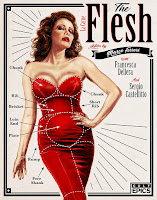Blu-rays of the Week
The Piano Teacher
(Criterion)
One of Austrian master Michael Haneke’s most memorably disturbing dramas,
this explosive 2001 character study introduces a repressed middle-aged woman still
living with her mother whose masochistic side is displayed when she takes up
with a younger man. Haneke unflinchingly depicts a bizarre but all too real
relationship usually kept hidden, and he has a willing partner in Isabelle
Huppert, who gives another of her scarily authentic portrayals of women acting
unlike most of us. There’s the usual superlative hi-def transfer from Criterion;
extras are Huppert’s select-scene commentary, new Huppert and Haneke interviews
and on-set footage.
The Flesh
(Cult Epics)
Another of late Italian director Marco Ferreri’s provocations, this 1991
entry centers around a desperate man who falls for a voluptuous beauty and
cannot stand to be apart from her intense sexuality; so when she decides to
leave him, he ends up stab…. Well, of course anyone who’s seen a Ferreri film
knows where this is headed, so there are no surprises—except for the tin-eared
use of Kate Bush’s “This Woman’s Work” and Queen’s “Innuendo”—but Sergio
Castellito’s lead performance and Francesca Dellera’s stunning looks keep us
interested for 90 minutes. The hi-def transfer is not bad; extras include
interviews with the two stars and director.
The Illustrated Man
Innocent Blood
The Law and Jake Wade
(Warner Archive)
Based on Ray Bradbury stories, 1969’s Illustrated
Man is a jumbled farrago of unrelated, supposedly scary tales, but the
scariest thing is the tattoos covering Rod Steiger’s body, while Claire Bloom provides
a dose of sanity in her too-brief appearance. John Landis has always been a
sledgehammer director, and even in his sporadically entertaining gangster
vampire flick, 1992’s Innocent Blood,
he can’t help but overdo everything, ruining the odd amusing moment and weird
thrill. John Sturges’1958 The Law and
Jake Wade is a compact western that pits Richard Widmark’s villain against Robert
Taylor’s marshal amid the snow-capped Sierra Nevada. All three films have great
new hi-def transfers; Illustrated
extra is a vintage featurette.
Rare—Creatures of the Photo Ark
(PBS)
National Geographic photographer Joel Sartore has made it his life’s work to create a “Photo
Ark”: a voluminous record of countless endangered and near-extinct wild animals
that he’s tracked down in as many zoos, natural preserves, sanctuaries as he
can—and even in the wild—and this three-hour, three-part documentary explores
both his worldwide quest and the reasons why so many species are disappearing
off the face of the planet. Sartore’s pictures show off these beautiful creatures
in their blazingly bright and colorful clarity, especially on Blu-ray.
Taken—Complete 1st Season
(Lionsgate)
Based on the popular movie (and its unnecessary sequels) with Liam Neeson as
a former CIA agent who tracks down his daughter’s kidnapers, this new TV drama
provides the backstory of Bryan Mills’ recruitment by a shadowy agency cabal to
find international terrorists. The first season’s 10 episodes are occasionally
absorbing and exciting, despite a plethora of plotholes. The fine cast is headed
by Clive Standen as Mills and Jennifer Beals as his CIA boss. The series looks
exceptional on Blu; lone extra is a making-of featurette.
2:22
(Magnolia)
An air-traffic controller suspended after nearly causing a mid-air collision
meets a beautiful young woman who was on one of the planes and tries to explore
the significance of the time 2:22 in his subconscious and, soon, his everyday
reality. Michiel Huisman and Teresa Palmer have fine chemistry as the couple
thrown together by bizarre circumstance, but they are dragged down by a
ridiculous plot that grows more incoherent as it goes along. The hi-def
transfer is excellent; extras include three behind-the-scenes featurettes.
DVDs of the Week
The Stopover
(First Run)
Pop singer turned actress Soko turns in a feisty performance in Delphine
and Muriel Coulin’s gritty drama about female French soldiers on their way home
from Afghanistan who, while on leave in Cyprus, must deal with horny men—both their
compatriots and the Arab locals who don’t often see Western women. This fascinating
glimpse behind the scenes of modern conflict demonstrates how cultural misunderstandings
can proliferate among allies and foes alike.
Viva La Liberta
(Icarus)
Writer-director Roberto Ando’s blunt political satire might be better
appreciated in its homeland of Italy, where the Berlusconi regime is still
fresh in the memory, but despite the presence of the great Toni Servillo in the
lead—er, leads—as a disgraced politician and his replacement twin brother, the movie
wanly attempts to puncture contemporary politics. A few scattered bulls-eyes don’t
compensate for treading such familiar territory without distinguishing itself
from predecessors from The Great Dictator
to Dave.
































